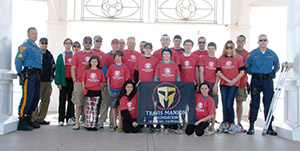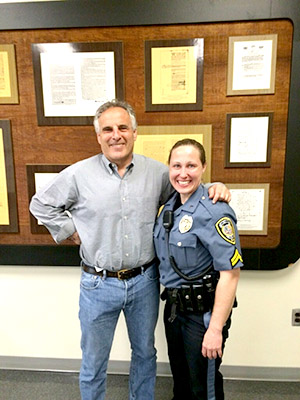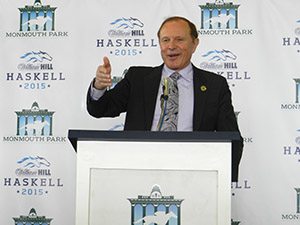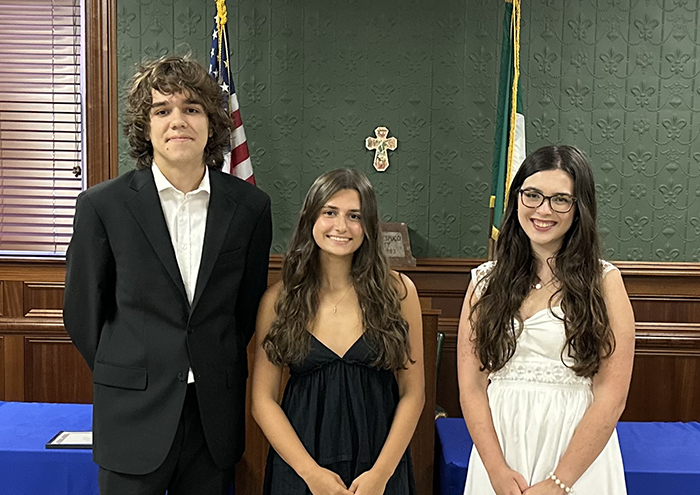
Travis Manion Foundation helps clean city beaches
May 15, 2015
Mayor Schneider presents police officer with award
May 15, 2015By Neil Schulman
Oceanport — Things are looking bright at Monmouth Park Racetrack this year due to the events and features planned, and with sports betting and casino revenue possible the future looks even brighter, officials said.

Dennis Drazin, advisor to Monmouth Park Racetrack’s operators, says the future is looking good for the track, for 2015 and beyond.

State Senator Ray Lesniak says he will continue to work on sports betting and casinos outside of Atlantic City, both of which will help the track stay prosperous.
At a press conference on Tuesday to mark the 2015 racing season — the track’s 70th season — which begins Saturday, Dennis Drazin, advisor to the New Jersey Thoroughbred Horsemen’s Association and Darby Development, operators of the track, said that in the four years since the group took over managing the racetrack from the state, they have turned things around.
With the possibility of sports betting and casinos outside of Atlantic City coming to boost the track’s revenue, things look good for the future too, he said.
“I’m happy to tell you we’re now self-sufficient,” Drazin told the group filling the Turf Club. “We’ve reversed our losing trend.”
Numbers from the 2014 season show that the track at least broke even, and may have made a profit. Over the last two years, attendance has improved and the handle has increased.
“We’re going to have a very strong season this year,” Drazin said.
A new restaurant, serving upscale food, is expected to open in July, or by the $1 million Haskell race on Aug. 2 at the latest.
The track could also see more revenue from an Off Track Wagering facility scheduled to open in Hillsborough, New Jersey.
Trainers involved with Monmouth Park have already had a strong season. Bob Baffert, who always enters horses in the Haskell, trained the first and third place winners in this year’s Kentucky Derby.
It’s also possible that by the end of the year, Monmouth Park will see a new form of wagering allowed — exchange wagering.
“It’s very big over in Europe,” Drazin said. Unlike the system in use at the track currently, which allows win, place and show bids before the race, exchange wagering would allow betting even after the race has started, with constantly changing odds.
In some of the bigger horse races that use this, “the handle’s close to $35 million on five or six horses in the field,” Drazin said.
Drazin is also optimistic about the coming years. He said he’s often asked what the future of horse racing in New Jersey will bring.
“We’re here to stay. There’s no one who’s going to close us down,” he said. “Racing will always be here.”
Two big issues that will affect the future of horse racing in the state are legalized sports wagering, and casinos outside of Atlantic City. Both seem promising for Monmouth Park at the moment.
In fall 2014, Monmouth Park was set to become the first facility in New Jersey to offer legalized bets on sports games, until several major sports leagues intervened and the case wound up in court.
Drazin said the case is currently before the Third Circuit Court of Appeals.
“I think we have a better than even chance,” he said. And even if they lose, the court’s ruling will give them a road map on what needs to be done to legally implement sports wagering.
Monmouth Park also is looking at implementing fantasy sports wagering, which he said is basically a form of sports betting “done by another means to skirt around the law.”
As for casinos, it looks as though there could be a referendum in November to install New Jersey’s first slot machines outside of Atlantic City. It looks as though there is a majority in the legislature to approve that.
While the current plan calls for casinos in Jersey City and the Meadowlands, Monmouth Park would be given a share of the revenues. That will allow them to offer better purses and keep New Jersey competitive to horse owners. All surrounding states supplement their racing industry with casino earnings.
State Senator
spoke about those issues. He said that his family has a long history with Monmouth Park.
“My dad would come here on Saturday. There was a train from Elizabeth. He came here with $40. He bet $20 in the first race,” Lesniak recalled.
For the last seven years, he’s been working on getting sports wagering legalized in New Jersey, a motion that two-thirds of state voters want. Earlier this year, he got a sports wagering bill through the legislature in just two days, incredibly fast for any bill.
“When the governor vetoed it, he said he didn’t have enough time to figure it out,” Lesniak said. Another version was approved a few weeks later.
Lesniak said that he thinks of the racing industry today like the ski industry in the 1990s. At that point, Generation X came along and popularized sports like snow boarding, making it hip and exciting again. Sports betting could give a similar push to the tracks.
“Hopefully, we will have a referendum on the ballot in November,” Lesniak said.




